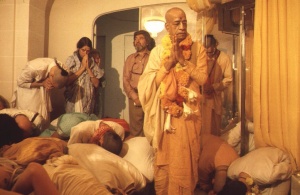CC Adi 17.269 (1975): Difference between revisions
(Vanibot #0027: CCMirror - Mirror CC's 1996 edition to form a basis for 1975) |
(Vanibot #0020: VersionCompareLinker - added a link to the Version Compare feature) |
||
| Line 2: | Line 2: | ||
<div style="float:left">'''[[Sri Caitanya-caritamrta (1975)|Śrī Caitanya-caritāmṛta (1975)]] - [[CC Adi (1975)|Ādi-līlā]] - [[CC Adi 17 (1975)|Chapter 17: The Pastimes of Lord Caitanya Mahāprabhu in His Youth]]'''</div> | <div style="float:left">'''[[Sri Caitanya-caritamrta (1975)|Śrī Caitanya-caritāmṛta (1975)]] - [[CC Adi (1975)|Ādi-līlā]] - [[CC Adi 17 (1975)|Chapter 17: The Pastimes of Lord Caitanya Mahāprabhu in His Youth]]'''</div> | ||
<div style="float:right">[[File:Go-previous.png|link=CC Adi 17.268 (1975)|Ādi-līlā 17.268]] '''[[CC Adi 17.268 (1975)|Ādi-līlā 17.268]] - [[CC Adi 17.270 (1975)|Ādi-līlā 17.270]]''' [[File:Go-next.png|link=CC Adi 17.270 (1975)|Ādi-līlā 17.270]]</div> | <div style="float:right">[[File:Go-previous.png|link=CC Adi 17.268 (1975)|Ādi-līlā 17.268]] '''[[CC Adi 17.268 (1975)|Ādi-līlā 17.268]] - [[CC Adi 17.270 (1975)|Ādi-līlā 17.270]]''' [[File:Go-next.png|link=CC Adi 17.270 (1975)|Ādi-līlā 17.270]]</div> | ||
{{CompareVersions|CC|Adi 17.269|CC 1975|CC 1996}} | |||
{{RandomImage}} | {{RandomImage}} | ||
==== TEXT 269 ==== | ==== TEXT 269 ==== | ||
<div class="verse"> | <div class="verse"> | ||
:prabhu tāṅre | :prabhu tāṅre namaskari' kaila nimantraṇa | ||
:bhikṣā karāiyā tāṅre kaila nivedana | :bhikṣā karāiyā tāṅre kaila nivedana | ||
</div> | </div> | ||
| Line 18: | Line 17: | ||
<div class="synonyms"> | <div class="synonyms"> | ||
prabhu—the Lord; tāṅre—to him; | prabhu—the Lord; tāṅre—to him; namaskari'-offering obeisances; kaila—did; nimantraṇa—invitation; bhikṣā—alms; karāiyā—giving; tāṅre—to him; kaila—submitted; nivedana—His prayer. | ||
</div> | </div> | ||
| Line 26: | Line 25: | ||
<div class="translation"> | <div class="translation"> | ||
The Lord offered him respectful obeisances and invited him to His house. After feeding him sumptuously, He submitted to him His petition. | The Lord offered him respectful obeisances and invited him to His house. After feeding him sumptuously, He submitted to him His petition. | ||
</div> | </div> | ||
| Line 32: | Line 32: | ||
<div class="purport"> | <div class="purport"> | ||
According to the system of Vedic society, whenever an unknown sannyāsī comes to a village or town, someone must invite him to take | According to the system of Vedic society, whenever an unknown sannyāsī comes to a village or town, someone must invite him to take prasāda in his home. Sannyāsīs generally take prasāda in the house of a brāhmaṇa because the brāhmaṇa worships the Lord Nārāyaṇa śilā, or śālagrāma-śilā, and therefore there is prasāda that the sannyāsī may take. Keśava Bhāratī accepted the invitation of Śrī Caitanya Mahāprabhu. Thus the Lord had a good opportunity to explain His desire to take sannyāsa from him. | ||
</div> | </div> | ||
Latest revision as of 16:26, 26 January 2020

A.C. Bhaktivedanta Swami Prabhupada
TEXT 269
- prabhu tāṅre namaskari' kaila nimantraṇa
- bhikṣā karāiyā tāṅre kaila nivedana
SYNONYMS
prabhu—the Lord; tāṅre—to him; namaskari'-offering obeisances; kaila—did; nimantraṇa—invitation; bhikṣā—alms; karāiyā—giving; tāṅre—to him; kaila—submitted; nivedana—His prayer.
TRANSLATION
The Lord offered him respectful obeisances and invited him to His house. After feeding him sumptuously, He submitted to him His petition.
PURPORT
According to the system of Vedic society, whenever an unknown sannyāsī comes to a village or town, someone must invite him to take prasāda in his home. Sannyāsīs generally take prasāda in the house of a brāhmaṇa because the brāhmaṇa worships the Lord Nārāyaṇa śilā, or śālagrāma-śilā, and therefore there is prasāda that the sannyāsī may take. Keśava Bhāratī accepted the invitation of Śrī Caitanya Mahāprabhu. Thus the Lord had a good opportunity to explain His desire to take sannyāsa from him.